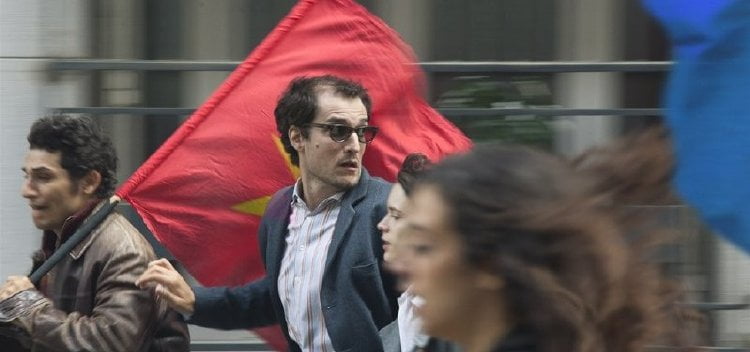Godard Mon Amour

Jean-Luc Godard (Louis Garrel) was the enfant terrible of the French Nouvelle Vague cinema movement of the early 1960s. Then, the youth world radicalized and the students and workers of France rose up to defy the bourgeois De Gaulle regime. The filmmaker is overwhelmed by the revolutionary fervor in his country and changes his cinematic direction in “Godard Mon Amour.”
Laura's Review: B-
'He was the Nouvelle Vague, the most gifted of a generation,' says teenaged actress Anne Wiazemsky (Stacy Martin, "Nymphomaniac") of her thirty-seven year old lover who, to her, was "Godard Mon Amour." Using Anne Wiazemsky's memoirs as a jumping off point and point of view, writer/director Michel Hazanavicius ("The Artist") and his star Louis Garrel have succeeded in making a funny film - just don't go into it thinking you are going to learn much about Jean-Luc Godard. The film, originally titled "Redoubtable" when it debuted at Cannes in 2017, is light on its feet, but Hazanavicius's attempts to reference Godard's filmmaking style within his own are superficial at best and the only film of his that is given any focus is "La Chinoise," the first he made with Wiazemsky. One would also get the impression that Godard's marriage to his second wife lasted only a few years (they were married from 1967 to 1979). As we see Godard shooting his story of a Maoist scholar, he opines that he always knew Anne would leave him. She was too beautiful, too young, too bourgeois. The couple we first meet enjoy dinner at Au Pays du Sourire, Gene Kelly musicals and lovemaking (which Hazanavicius shoots in black and white, largely in close-up). Trouble begins to brew when they take their film to the Avignon Film Festival. "La Chinoise" isn't well received, the Chinese Embassy reportedly calling it 'that of a revolutionary imbecile.' As Godard begins to ally himself with the student revolutionaries of Paris in 1968, his contrariness begins to surface. Compared by one to Mickey Mouse and Coca Cola, Godard folds. He backs general strikes until he's inconvenienced. His own mid-life crisis makes him strike out at the elderly, shocking his friends with his rudeness to a French war veteran and his wife. When Anne wished to attend Cannes in support of their friend Michel Cournot's (Grégory Gadebois) film, Jean-Luc mocked her, then arrived later to shut down the festival in solidarity with protesters. He pushes her to accompany him to Rome to collaborate with Bernardo Bertolucci (Guido Caprino), then insults his filmmaking friend. Garrel, sporting Godard's bald crown and signature black framed glasses (a running joke has them continually getting broken), makes peevishness amusing. In the film's funniest scene, an overloaded car makes the trip back from Cannes, an experience Godard ensures is hellish for everyone. In another, Jean-Luc and Anne discuss gratuitous nudity in films while both brush their teeth fully nude (he will later object to her nude scenes in Marco Ferreri's "The Seed of Man"). But Hazanavicius's instincts are sometimes questionable. He puts a jaunty spin on violent May riots with bouncy music and has a fan ask Godard when he'll return to 'making funny movies,' just like in Woody Allen's "Stardust Memories." Martin's hair is a brunette bob, just like Godard's first wife Anna Karina, rather than Wiazemsky's longer, strawberry blonde locks. And although the story is purportedly from her POV, we learn little of Anne. The film concludes entirely from Godard's perspective. "Godard Mon Amour" entertains as it pokes fun at Jean-Luc's pretensions, but it leaves one wishing its comedy was more trenchant. Grade:
Robin's Review: B+
A film about the radical years of 1967 and ‘68 and the impact they had on the ideas and career of Jean-Luc Godard seems like serious stuff, full of portent and intellectualism. Put it into the hands of writer/director Michel Hazanavicius, who I first came to appreciate with his 2006 comedy spoof, “OSS-117: Cairo, Nest of Spies,” turns what could be high drama into a funny biopic full of whimsy and humor. Hazanavicius adapts the novel by Godard’s young wife Anne Wiazemsky, Un an après, an account of the political radicalization of the man who brought to the world of cinema his breakthrough, “Breathless” in 1960. Godard’s world, in the film, is shown through the eyes of 18-year old actress, Anne (Stacy Martin), the star of Godard’s latest opus, “La Chinoise,” and, soon, his wife. The personal events of the two years of Godard’s life are beautifully played by Louis Garrel, who captures the ego, arrogance and signature spectacles of the auteur. It also shows the very serious persona that Godard so carefully groomed to his own thinking, often disregarding everyone’s, especially Anne’s, feelings. Stacy Martin, as much younger than Jean-Luc’s muse, Anne, is more observer than participant and we see his world through her eyes. The filmmakers capture the mood, excitement and spontaneous acts of violence that so identified the turbulent 1960s, especially in Paris. But, what surprised me most is the humor Hazanavicius injects into what I would perceive as the arrogant egotism of Godard. I was not prepared for, and pleasantly surprised, by the whimsy that is the foundation of “Godard Mon Amour.”

